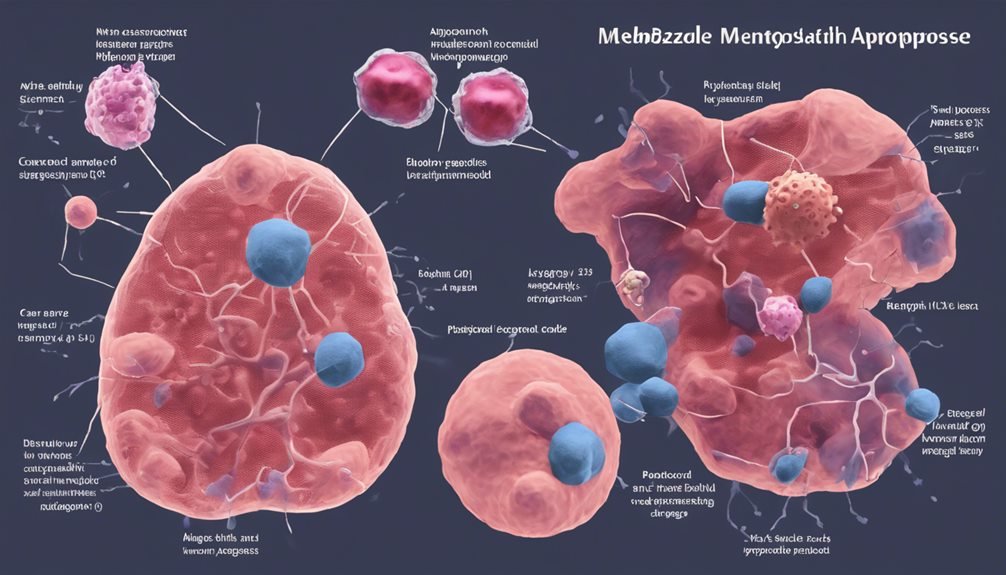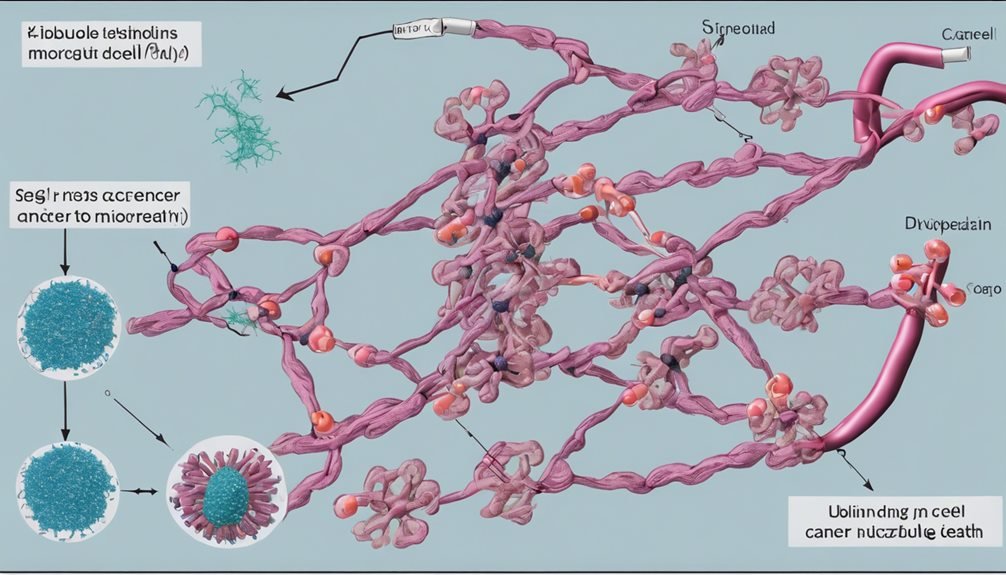When considering how Mebendazole operates as an anti-cancer agent, you'll find its mechanism of action intriguing. By disrupting crucial cellular functions and pathways, this drug exhibits multifaceted effects on cancer cells. The way it interferes with microtubule structures and triggers programmed cell death offers a glimpse into its potential as a targeted therapy. As you explore further, you may uncover the intricacies of Mebendazole's impact on cancer progression and its implications for future treatment strategies.
Key Takeaways
- Disrupts microtubule structure, inhibiting cancer cell division.
- Blocks angiogenesis, halting tumor growth and spread.
- Induces cancer cell death through apoptosis.
- Enhances immune response against cancer cells.
- Targets cancer progression pathways, inhibiting growth.
History of Mebendazole
Mebendazole, a benzimidazole anthelmintic drug, has a long history of use in treating parasitic infections in humans. Its discovery timeline dates back to the 1970s when it was first introduced as a broad-spectrum anthelmintic medication. Initially, mebendazole was primarily utilized for the treatment of parasitic worm infections, such as roundworm, hookworm, and whipworm. Over the years, its therapeutic applications have expanded beyond parasitic diseases.
Mebendazole's journey as an anti-cancer agent began with studies revealing its potential to inhibit cancer cell growth by targeting microtubules. Researchers observed that mebendazole showed cytotoxic effects on various cancer cell lines, sparking interest in its repurposing for oncology.
Subsequent preclinical studies demonstrated promising results, leading to ongoing clinical trials investigating its efficacy in treating various types of cancer.
The evolution of mebendazole from an anthelmintic drug to a potential anti-cancer agent showcases the importance of repurposing existing medications for novel therapeutic applications, highlighting the potential for drug discovery and development in serving the medical community.
Antiparasitic Properties
The antiparasitic properties of mebendazole contribute significantly to its pharmacological profile, showcasing its efficacy in targeting various parasitic infections. Mebendazole, originally discovered for its anthelmintic properties, has shown promise in treating parasitic infections such as pinworm, whipworm, roundworm, and hookworm. Its mechanism of action involves disrupting the microtubule structure in parasitic cells, leading to their immobilization and eventual death.
Through drug discovery efforts, mebendazole has been repurposed from its original use as an antiparasitic agent to a potential anti-cancer drug. This transition highlights the versatility of mebendazole and its potential to serve as a multifaceted therapeutic agent.
The success of mebendazole in treating parasitic infections has paved the way for further exploration of its pharmacological properties in combating other diseases. By understanding how mebendazole targets parasitic infections at a cellular level, researchers have been able to uncover its broader applications in the realm of drug development and treatment strategies.
Anti-Cancer Potential

Demonstrating notable potential in the realm of oncology, mebendazole's transition from an antiparasitic agent to a promising anti-cancer drug has sparked immense interest within the scientific community. In clinical applications, studies have shown that mebendazole exhibits anti-cancer properties by targeting various pathways involved in cancer progression.
Mechanistic insights reveal that mebendazole exerts its anti-cancer effects through multiple mechanisms. One key mechanism is its ability to disrupt microtubule dynamics, leading to cell cycle arrest and ultimately inducing cancer cell death.
Additionally, mebendazole has been found to inhibit angiogenesis, the process of new blood vessel formation crucial for tumor growth and metastasis.
Furthermore, mebendazole has shown immunomodulatory effects by enhancing the immune response against cancer cells.
The promising anti-cancer potential of mebendazole is paving the way for further research and clinical trials to explore its efficacy in treating various types of cancer. With its well-established safety profile as an antiparasitic agent, mebendazole holds great promise as a cost-effective and readily available option for cancer therapy.
Inhibiting Cancer Cell Growth
Inhibiting cancer cell growth involves targeting key pathways and mechanisms essential for tumor proliferation and progression. Mebendazole, as an anti-cancer agent, exerts its effects by disrupting the cell cycle and inducing apoptosis pathways in cancer cells.
The cell cycle is tightly regulated, with checkpoints ensuring proper progression or triggering cell death if abnormalities are detected. Mebendazole interferes with this process by arresting cells at specific phases, preventing them from dividing and proliferating uncontrollably.
Additionally, apoptosis pathways play a crucial role in eliminating damaged or unwanted cells. Mebendazole promotes apoptosis in cancer cells, leading to their death and inhibiting further growth.
By modulating these fundamental processes, Mebendazole effectively hinders cancer cell growth and progression. Understanding the intricate mechanisms through which Mebendazole acts provides insights into its potential as a targeted therapy for various types of cancer.
Further research is needed to fully elucidate the specific interactions and pathways involved in Mebendazole's anti-cancer effects.
Inducing Cancer Cell Death

Promoting programmed cell death, also known as apoptosis, is a pivotal strategy in combating cancer progression. Mebendazole, as an anti-cancer agent, induces apoptosis in cancer cells, ultimately leading to their death. This process is crucial in preventing the uncontrolled growth and spread of cancer cells throughout the body.
One way Mebendazole induces apoptosis is by regulating the cell cycle. Cancer cells often have dysregulated cell cycles, leading to uncontrolled proliferation. Mebendazole targets specific proteins involved in cell cycle progression, causing cell cycle arrest and subsequent apoptosis in cancer cells.
By disrupting the cell cycle, Mebendazole halts the growth of cancer cells and promotes their programmed death.
Through apoptosis induction and cell cycle regulation, Mebendazole effectively targets cancer cells, inhibiting their survival and proliferation. Understanding the mechanisms by which Mebendazole induces cancer cell death is essential in developing targeted therapies that can combat cancer progression and improve patient outcomes.
Molecular Mechanisms
Continuing the exploration of Mebendazole's impact on cancer cells, understanding the molecular mechanisms underlying its anti-cancer effects is paramount. Mebendazole exerts its anti-cancer properties by targeting pathways crucial for cancer cell survival and proliferation.
One key mechanism involves the disruption of microtubule dynamics, essential for cell division. By binding to tubulin, Mebendazole interferes with spindle formation, leading to mitotic arrest and ultimately cell death.
Moreover, Mebendazole has been shown to modulate cellular responses involved in apoptosis, the programmed cell death process. It upregulates pro-apoptotic proteins while downregulating anti-apoptotic factors, shifting the balance towards cell death.
Additionally, Mebendazole has been reported to inhibit angiogenesis, the formation of new blood vessels crucial for tumor growth, by affecting endothelial cell function.
Targeting Cancer Cells

To effectively target cancer cells, it's imperative to consider Mebendazole's specific interactions at the cellular level. Mebendazole exerts its anti-cancer effects by inducing apoptosis and arresting the cell cycle in cancer cells. Here are four key points highlighting how Mebendazole targets cancer cells:
- Apoptosis Induction: Mebendazole triggers programmed cell death, known as apoptosis, in cancer cells. This process helps eliminate cancerous cells and prevents their uncontrolled proliferation.
- Cell Cycle Arrest: Mebendazole disrupts the cell cycle progression in cancer cells, leading to their growth inhibition and ultimately cell death. By arresting the cell cycle, Mebendazole hinders the unregulated division of cancer cells.
- Selective Toxicity: Mebendazole exhibits selective toxicity towards cancer cells while sparing normal cells. This targeted approach minimizes side effects commonly associated with traditional chemotherapeutic agents.
- Anti-Angiogenic Effects: Mebendazole also demonstrates anti-angiogenic properties, inhibiting the formation of new blood vessels that support tumor growth. By cutting off the tumor's blood supply, Mebendazole helps in starving the cancer cells.
Preclinical Studies
How do preclinical studies contribute to our understanding of Mebendazole's potential as an anti-cancer agent? Preclinical studies play a crucial role in determining the efficacy and safety of Mebendazole as a potential anti-cancer treatment. These studies involve investigating the effects of the drug on cancer cells in laboratory settings and animal models before advancing to human trials. Two key aspects assessed during preclinical studies are toxicity assessment and pharmacokinetic profiling.
| Preclinical Study Aspect | Description |
|---|---|
| Toxicity Assessment | Evaluates the potential harmful effects of Mebendazole on normal cells and tissues, helping to determine safe dosage levels for further testing. This assessment is essential for ensuring the drug's safety profile. |
| Pharmacokinetic Profiling | Examines how the body absorbs, distributes, metabolizes, and excretes Mebendazole. Understanding the drug's pharmacokinetics aids in predicting its behavior in humans, guiding dosing regimens for clinical trials. |
Clinical Trials

Clinical trials are pivotal in assessing the safety and efficacy of Mebendazole as an anti-cancer agent in human subjects. Conducted in controlled settings, these trials provide crucial data on patient outcomes and treatment responses. Here are four key aspects to consider:
- Patient Selection: Clinical trials carefully select participants based on specific criteria to ensure the safety and effectiveness of the treatment. This process helps researchers understand how Mebendazole impacts different patient groups.
- Treatment Protocols: During the trials, researchers establish standardized treatment protocols to administer Mebendazole consistently. This consistency allows for accurate evaluation of treatment responses across all participants.
- Monitoring and Data Collection: Continuous monitoring of patients and systematic data collection are essential in clinical trials. This meticulous approach enables researchers to track patient outcomes and assess the effectiveness of Mebendazole in combating cancer.
- Statistical Analysis: Data from clinical trials undergo rigorous statistical analysis to determine the treatment's impact on patient outcomes. This analysis helps researchers draw meaningful conclusions regarding Mebendazole's efficacy as an anti-cancer agent.
Safety and Efficacy
Evaluating the safety and efficacy of Mebendazole as an anti-cancer agent is a critical endeavor in the realm of oncology research. Clinical trials have shown promising results regarding its efficacy in inhibiting cancer cell growth and inducing cancer cell death. Patient outcomes have revealed improvements in tumor regression and prolonged survival rates when Mebendazole is incorporated into treatment regimens.
When considering safety, Mebendazole has exhibited a favorable side effect profile in these clinical trials. Common side effects reported include mild gastrointestinal disturbances such as nausea and diarrhea, which are generally well-tolerated by patients. Serious adverse events are rare, making Mebendazole a relatively safe option for cancer treatment.
Future Research Directions

For future research directions concerning Mebendazole as an anti-cancer agent, exploring its mechanism of action at the molecular level is imperative. Understanding how Mebendazole interacts with cancer cells can provide insights into its efficacy and potential for further development as a therapeutic option. To advance the field and maximize the impact of Mebendazole in cancer treatment, consider the following research directions:
- Combination Therapies: Investigate the synergistic effects of Mebendazole with other anti-cancer agents to enhance treatment outcomes and potentially overcome drug resistance mechanisms.
- Drug Resistance Mechanisms: Explore the mechanisms underlying resistance to Mebendazole to develop strategies that can circumvent or reverse this resistance and improve treatment efficacy.
- Molecular Signaling Pathways: Elucidate the specific molecular pathways targeted by Mebendazole within cancer cells to identify potential biomarkers for patient stratification and personalized treatment approaches.
- Preclinical and Clinical Studies: Conduct further preclinical and clinical studies to validate the efficacy and safety of Mebendazole in different cancer types and patient populations, paving the way for its translation into clinical practice.
Implications for Cancer Treatment
The potential integration of Mebendazole as an anti-cancer agent into current treatment protocols holds significant promise for improving therapeutic outcomes in diverse cancer types. Clinical applications of Mebendazole in cancer treatment are being explored in various studies, demonstrating its efficacy in inhibiting cancer cell growth, inducing cell death, and reducing tumor progression. Its mechanism of action involves targeting microtubules, which are essential for cell division and growth.
By disrupting this process, Mebendazole shows therapeutic potential in not only killing cancer cells but also potentially overcoming drug resistance mechanisms.
The implications for cancer treatment are profound, with Mebendazole offering a novel approach to combating cancer that could complement existing therapies. Its ability to inhibit multiple pathways involved in cancer development makes it a promising candidate for combination treatments. Furthermore, the well-established safety profile of Mebendazole as an FDA-approved drug for parasitic infections could expedite its translation into clinical practice for cancer treatment.
Frequently Asked Questions
Can Mebendazole Be Used in Combination With Other Cancer Treatments?
Yes, mebendazole can be used in synergistic combinations with other cancer treatments. Clinical trials have shown promising results when mebendazole is combined with traditional chemotherapy or targeted therapy. Efficacy in synergistic combinations is being explored to enhance treatment outcomes and potentially reduce side effects.
Further research is needed to better understand the optimal combinations and dosages for different types of cancer.
Are There Any Known Drug Interactions With Mebendazole?
When considering Mebendazole interactions, it's essential to note its safety profile. Mebendazole has a low risk of interactions with other drugs due to its minimal systemic absorption.
However, caution should be exercised when combining it with certain medications that affect liver enzymes, such as rifampicin or carbamazepine.
Always consult your healthcare provider to ensure Mebendazole's safety when taken alongside other medications.
Does Mebendazole Have Potential Side Effects on Healthy Cells?
Yes, mebendazole does have potential toxicity on healthy tissues. While it primarily targets cancer cells, it can also affect normal cells, leading to side effects. Common side effects may include gastrointestinal upset, liver enzyme abnormalities, and bone marrow suppression. Understanding these risks is crucial in managing treatment with mebendazole and monitoring patients for any signs of toxicity to ensure the best possible outcomes in cancer therapy.
How Long Does It Typically Take to See Results With Mebendazole Treatment?
When starting Mebendazole treatment, individuals often anticipate Mebendazole's effectiveness to manifest within weeks. However, the treatment timeline can vary based on factors like cancer type and stage.
For some, positive results may be noticeable sooner, while for others, it might take several weeks to months. Regular monitoring and follow-ups with your healthcare provider are crucial to assess progress and adjust the treatment plan accordingly.
Is Mebendazole Accessible and Affordable for All Cancer Patients?
Yes, mebendazole is generally considered accessible and affordable for many cancer patients. Its cost and accessibility can vary based on factors like location and health insurance coverage. As a treatment, mebendazole is often more affordable compared to traditional cancer therapies. Some patients may find it accessible through prescription or clinical trials. Overall, efforts are being made to ensure that mebendazole remains a viable and cost-effective option for cancer treatment.
Conclusion
In conclusion, Mebendazole's anti-cancer properties have shown great promise in inhibiting tumor growth and inducing apoptosis in cancer cells. Interestingly, a recent study found that Mebendazole was able to reduce tumor growth by 50% in animal models. With its targeted mechanism of action and minimal side effects, Mebendazole presents a cost-effective and safe option for cancer therapy that warrants further research and clinical trials.





